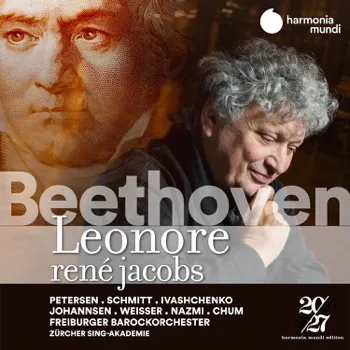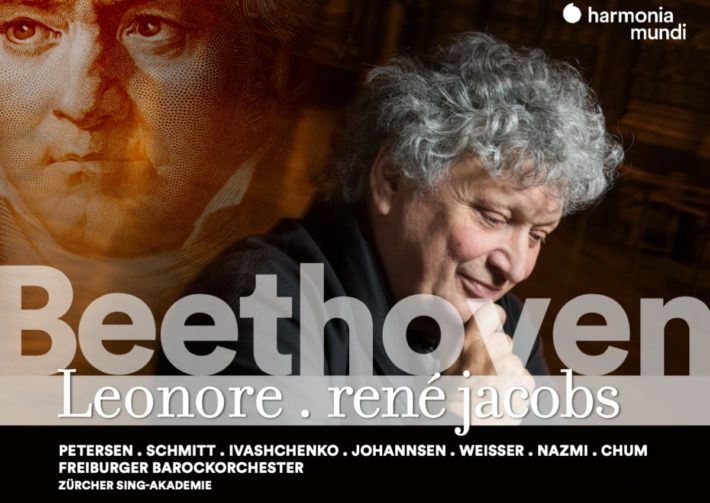This is not the first performance of “Leonore”, the first version of what ultimately became “Fidelio”. One was recorded in 1976, features the Staatskapelle Dresden conducted by Herbert Blomstedt, while another features the Orchestre Révolutionnaire et Romantique, led by John Eliot Gardiner. The Gardiner is played on original instruments, as is this new release.

Gardiner’s recording isn’t exactly the original “Leonore”; instead, he uses that score as the basis for his own version, incorporating various revisions from later years. He also replaces the original dialogue with a newly written narration, read by an actor. In his version, Jacobs has also adapted the dialogue, cutting some passages and modernizing the language, which may prove bothersome to German speakers.
It is beyond the scope of this review to debate the worthiness of performing and recording Beethoven’s first version. Jacob’s offers four cogently argued reasonings for why the 1805 Leonore is the best version of Beethoven’s opera. Yet after several listenings, it still sounds like a work in progress. Nevertheless, it is fascinating to hear Beethoven’s first thoughts and to discover what he felt should be revised or removed. And in this new recording the work receives thrilling and committed advocacy by Jacob’s and his musicians.
The performance opens with a gripping rendition of Leonore Overture No. 2. The Freiburger orchestra play with fabulous precision and palpable enjoyment. This orchestra revels in the colors it can produce, with powerful timpani, rasping horns, fruity woodwinds and a string ensemble that radiates a warmth and richness inconceivable from period orchestras a generation ago. Anyone familiar with Jacob’s recordings of the Mozart Operas and Bach Passions will know what to expect: an orchestral contribution that is a fully equal partner in conjuring the drama and emotion import of the text. Jacobs has also shown a preference for lighter, more agile voices in those recordings, and that preference is also apparent here.
Robin Johannsen is an excellent Marzelline, presenting a convincing portrayal of a young, flirtatious woman in love with Fidelio, much to the chagrin of Jaquino (Johannes Chum). One of the great strengths of Jacobs’ Mozart opera recordings is how naturally the interaction between characters flow, and that quality is also clearly heard here. Jacobs’ ensures we are swept up into the thoughts and actions of these characters – just listen to “Jetzt, Schätzchen, jetzt sind wir allein” (CD 1, track 5), where Marzelline continually refuses Jaquino’s offers of marriage, or “Mir ist so wunderbar” (CD 1, track 9), where we glimpse the deeply hidden desires and worries of Marzelline, Leonore, Rocco and Jaquino, here sung with a beguiling sensitivity by Johannsen, Petersen, Ivashchenko and Chum.
The second scene of Act II includes a gorgeous duet for Marzelline and Leonore that Beethoven later cut because it disrupted the dramatic flow. Performed here by Johannsen and Petersen with a gorgeous tone and seamless legato, any disruption to the drama is barely noticeable. However, a notable break in the flow comes towards the end of the work, in the Recitative and Duet “Ich kann mich noch nicht fassen,” sung by Florestan and Leonore (CD 2, track 10). Though it is beautifully sung by Schmitt and Petersen, Beethoven’s decision to cut it proves convincing. And therein lies perhaps the most enjoyable aspect of this new recording: Jacobs and his musicians are allowing us to hear Beethoven’s initial thoughts. We can then compare these thoughts with what his final decisions were in Fidelio. We are in the enviable position of not having to choose.
Jacobs’ note is followed by a short yet informative essay by Ksenija Zadravec, as well as a complete libretto. Harmonia Mundi’s sound offers great clarity within a wide soundstage, and a warm bloom to both voices and instruments. Gardiner’s recording has been my first choice for this opera but is now displaced by this newcomer. Any lover of Beethoven’s opera should be keen to hear and own both versions of Beethoven’s operatic masterpiece.
Beethoven – “Leonore”
Marlis Petersen – Leonore (Soprano)
Maximilian Schmitt – Florestan (Tenor)
Dimitry Ivashchenko – Rocco (Bass)
Robin Johannsen – Marzelline (Soprano)
Johannes Weisser – Don Pizarro (Baritone)
Tareq Nazmi – Don Fernando (Bass)
Johannes Chum – Jaquino (Tenor)
Zürcher Sing-Akademie
Freiburger Barockorchester
René Jacobs – Conductor




















